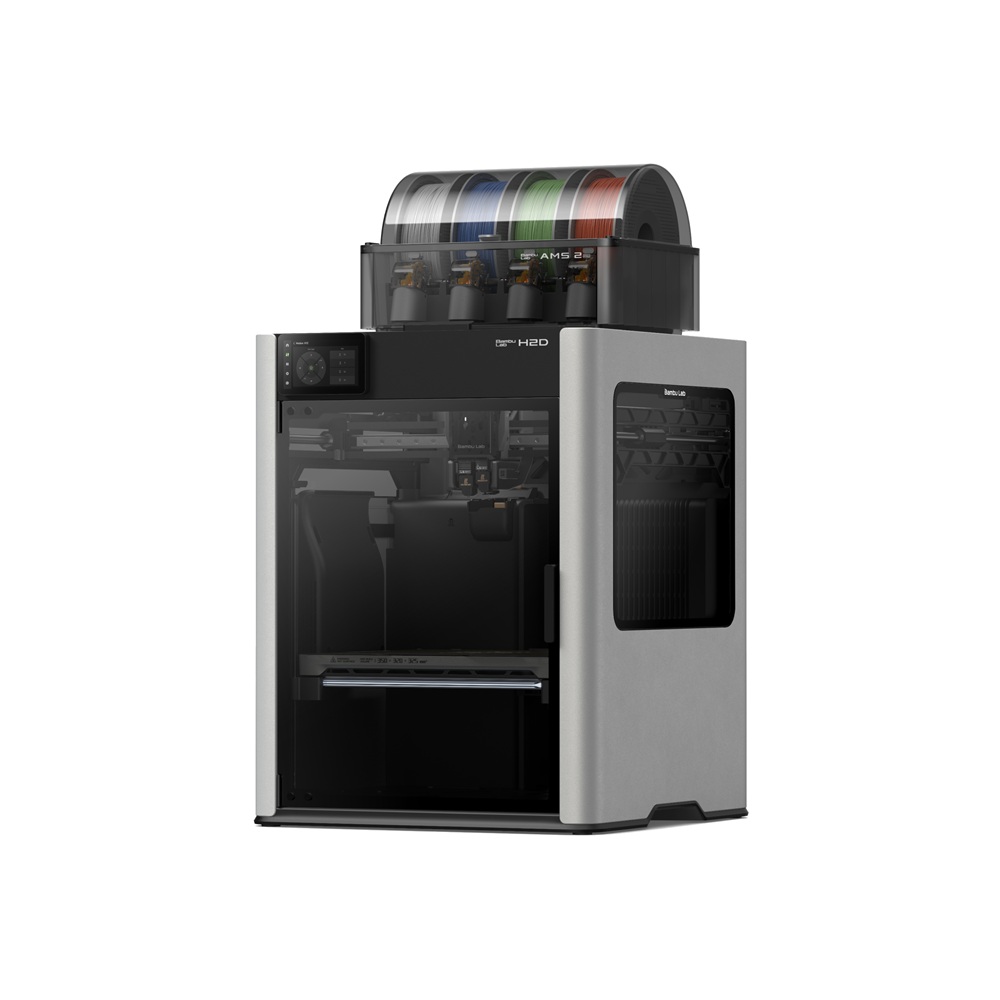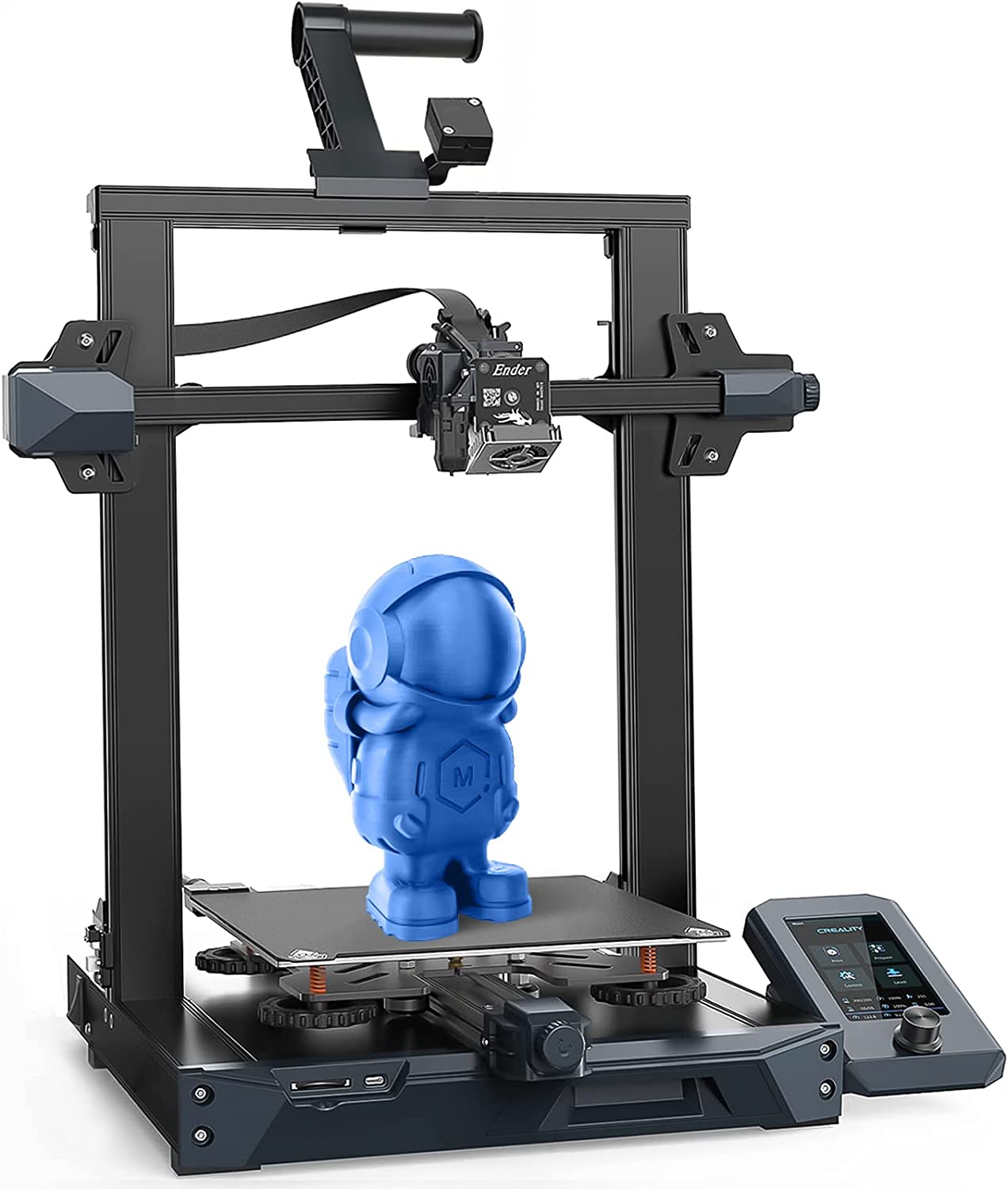Compare H2D vs Ender 3 S1
Comparison between the best 3D printers
Choose the best 3D printer at the best price. The cheapest 3D printers are here.
Buy a 3D printer here with 3D Fila.
 |
 |
|
| Model | H2D |
Ender 3 S1[BUY Ender 3 S1] |
| Printing Material | Filament | Filament |
| Buy Filament for Bambu Lab H2D | Buy Filament forCreality 3D Ender 3 S1 | |
| Estimated price | $1899,00 | $399,00 |
| Manufacturer | Bambu Lab | Creality 3D |
| Release Year | 2025 | 2021 |
| Print Volume [mm] | 350x320x325 | 220x220x270 |
| Printer Size [mm] | 492x514x626 | 455x490x625 |
| Weight [kg] | 42,3 | 9,1 |
| Power Loss Recovery | YES | YES |
| Enclosed printer | YES | NO |
| Bed Leveling | Automatic | Automatic |
| Filament End Sensor | YES | YES |
| Bed type | Heated | Heated |
| Power supply system | Direct Drive | Direct Drive |
| Standard nozzle | 0,4 | 0,4 |
| Maximum Nozzle Temperature [°C] | 350 | 260 |
| Maximum Bed Temperature [°C] | 120 | 100 |
| Maximum printing speed [mm/s] | 600 | 180 |
| Filament holder | YES | YES |
| Camera for supervision | YES | YES |
| Recommended filaments | PLA, PETG, ABS, ASA, TPU, PVA, Nylon (PA) | PLA, TPU, PETG, ABS |
| Recommended slicers | Bambu Studio | Cura, Simplify, Slic3r, IdeaMaker, Creality Slicer e outros |
| Maximum Resolution [mm] | 0,01 | 0,05 |
| Processor | ||
| Display | Touchscreen 5'' | Display 4,3'' |
| Power Supply | ||
| Connectivity | Wifi, Bambu bus, Cartão SD | SD / USB |
| Operating systems | Windows, Mac, Linux | Windows, Mac, Linux |
| Date of registration in the system | 2025-03-31 | 2023-03-28 |
| Release date | 2025 | 2021 |
| Extra features | Bambu Labs H2D combines high-speed 3D printing with a chamber heated up to 65 °C, dual extrusion with automatic nozzle switching, an AMS for filament drying and exchange, and AI sensors that detect failures. It offers optional laser and digital cutting capabilities, features intelligent calibration through computer vision, vibration control, enhanced fire safety, and real-time camera monitoring. | The Creality Ender 3 S1 printer stands out for its easy assembly and quiet operation. It has automatic bed leveling and a direct drive system, providing high-quality prints. The design is sleek, with flat cables in mesh sleeves and a magnetic bed. The Creality Sprite extruder is lightweight and developed in-house, supporting a maximum nozzle temperature of 260 degrees. It includes a filament run-out sensor and power loss recovery, with a dual Z-axis for greater support and stability. The build plate is flexible steel with PC coating, and the printer supports a wide variety of filaments. |
| Support for multiple colors and materials (AMS and CFS) | YES | NO |
Notes * |
||
| Cost-benefit | 7 / 10 | 7 / 10 |
| Hardware | 7.2 / 10 | 2 / 10 |
| Tela | . | . |
| Print volume | 4 / 10 | 3 / 10 |
| Performance | 5 / 10 | 1 / 10 |
| [BUY Ender 3 S1] |
Conclusion |
| In comparing the Bambu Lab H2D and the Creality Ender 3 S1, several key differences emerge that will guide potential buyers in choosing the right 3D printer for their needs. The H2D, released in 2025, offers advanced features such as a larger print volume, significantly higher maximum printing speeds, and the ability to handle a wider variety of filaments, including those requiring higher temperatures. Its enclosed design enhances the printing environment, particularly for materials that are sensitive to temperature fluctuations. With features such as dual extrusion, intelligent calibration, and a higher maximum resolution, the H2D is well-suited for users seeking high-performance, versatile printing capabilities and advanced functionalities like AI sensors and real-time monitoring. On the other hand, the Ender 3 S1, which has been on the market since 2021, is more budget-friendly and is known for its ease of assembly and operation, making it an excellent choice for beginners or hobbyist users. Despite its smaller print volume and lower speed, the Ender 3 S1 still provides high-quality outputs with its reliable direct drive system and automatic bed leveling. Its lightweight and sleek design, along with the support for common filaments, cater to users focused on basic 3D printing tasks without the complexity of more advanced models. Ultimately, the choice between these two models boils down to user requirements and budget. The H2D stands out for its performance and feature set, ideal for professional or dedicated enthusiasts, while the Ender 3 S1 offers a cost-effective, user-friendly solution perfect for novices or those who prioritize simplicity in their 3D printing experience. |

